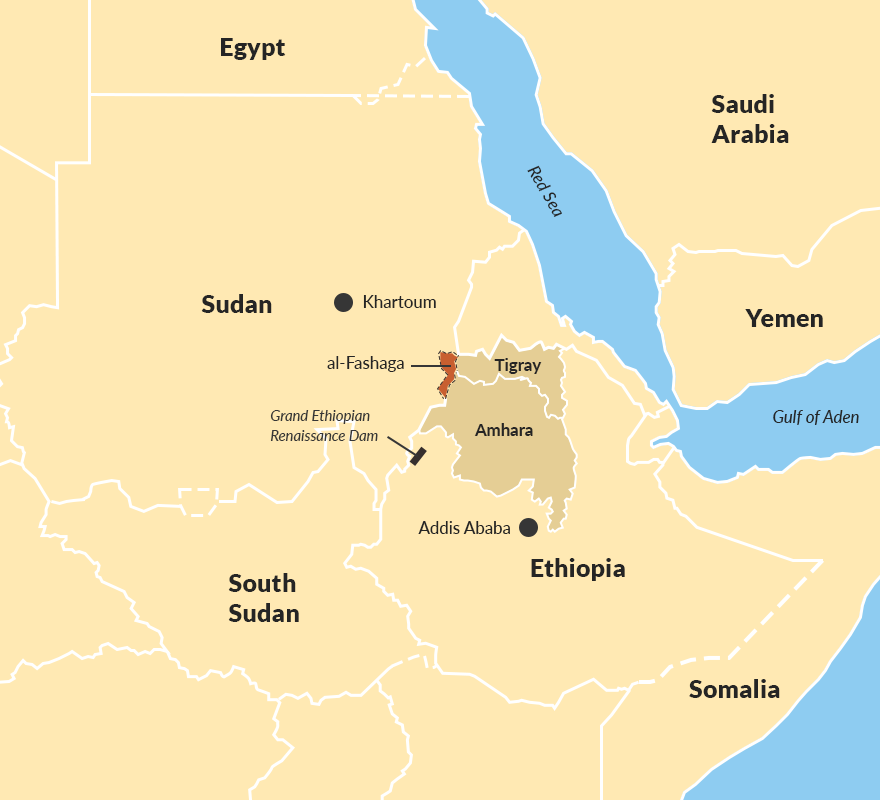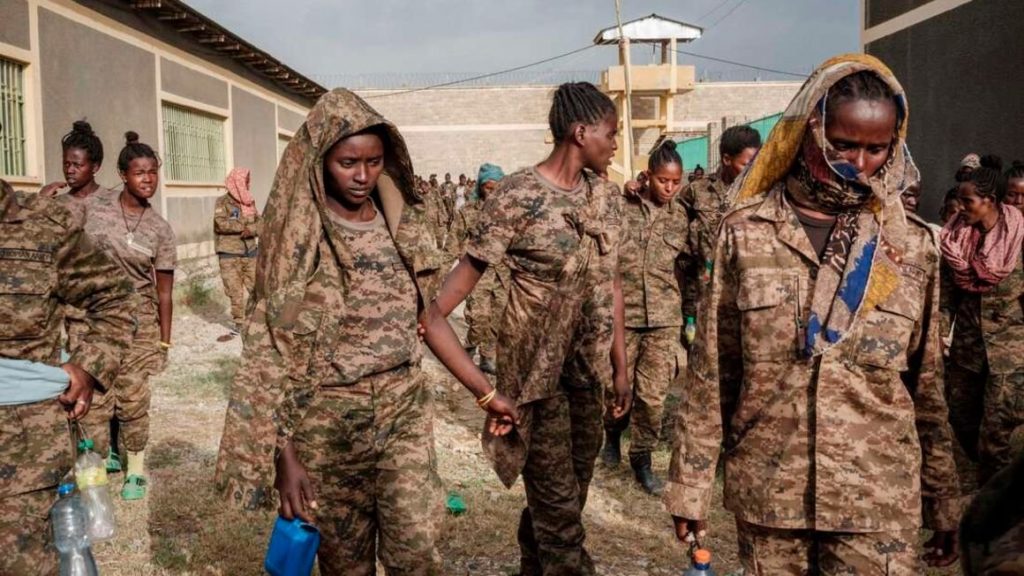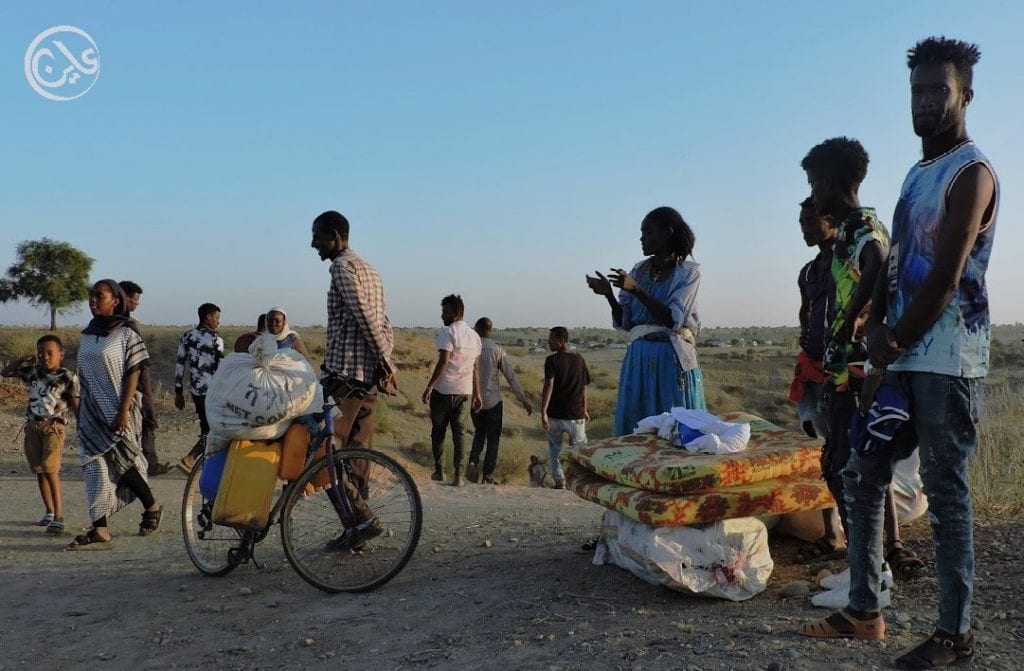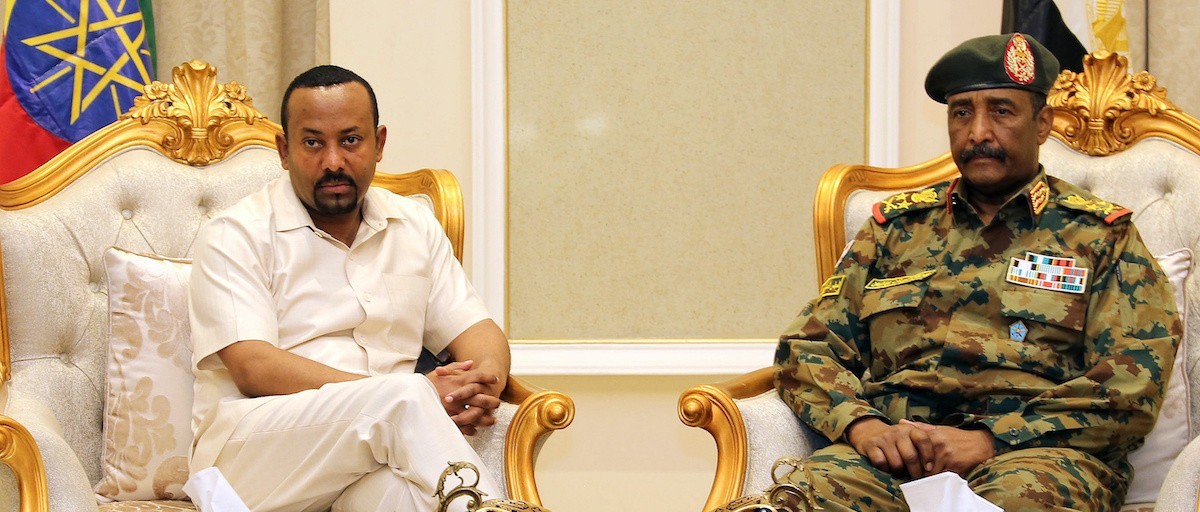No end in sight – As Ethiopia’s war escalates, relations with Sudan remain strained
19 August 2021
On Sunday, Prime Minister Abdalla Hamdok said Sudan would continue pushing for a peaceful solution to the civil war in Ethiopia, despite Ethiopia rejecting a mediation offer made earlier in the month. “We will continue to exert all efforts for Ethiopia to become stable, unified, and secure,” the premier said in a press conference in the capital, Khartoum.
Last week, Sudan had recalled its ambassador to Ethiopia for “consultations” after Addis Ababa spurned a push by Khartoum to help resolve the conflict. Previously, Ethiopia said its trust in some of Sudan’s leaders had been “eroded,” and accused Sudan’s army of launching an “incursion” into Ethiopian territory.
Diffusing political tensions for both countries, however, remains crucial.
The Tigrayan rebels, the Tigrayan People’s Liberation Front (TPLF) could gain a significant advantage if they managed to gain access points along the Sudanese border, says political analyst Chalachew Tadesse. Since the conflict broke out in November last year between the Ethiopian National Defense Forces (ENDF) and Tigray rebels, the national army has relied on an Amhara militia to control the strategic Wolkayt-Humera corridor, blocking the TPLF crucial supply access routes in Sudan, Tadesse added. Instead, Ethiopia’s government insists that the Djibouti-Afar-Tigray humanitarian corridor is sufficient to deliver food supplies to Tigray, rejecting international calls to open the Sudan corridor.
With Sudan’s transitional government already grappling with a myriad of domestic challenges, there may be little appetite to escalate regional tension into a regional conflict by openly siding with the TPLF, the analyst added. Nevertheless, the TPLF has established a strong relationship with Sudan since its liberation war of the 1980s against Ethiopia’s former regime.

Border tensions
Sudan currently occupies a large swath of the al Fashaga border region between the two countries. On Monday, Sudanese Prime Minister Hamdok paid a visit to the Al Fashaga border area and asserted that Sudan would never make any concessions over the fertile region. Both Hamdok and Sovereign Council Chairman Lt.-Gen. Abdul Fattah al Burhan inaugurated new bridges and roads linking al Fashaga to the Sudanese heartland.
Monday’s visit was the latest sign of Sudan’s defiance against Ethiopia’s repeated calls for Sudanese troops to return to their positions before the war in Ethiopia’s region of Tigray. Ethiopian officials have accused Sudan of taking advantage of the Tigray conflict to occupy the contested border region.
Sudan has long claimed the disputed border al-Fashaga region falls under Sudanese territory per a 1902 colonial border demarcation. But Ethiopian authorities refused to recognise this border delineation during December talks in Sudan’s capital, Khartoum. The meeting ended, as it did in 1998, without an agreement. The matter is further muddled by the fact that former dictator Omar al-Bashir had maintained a ‘soft border’ for the 600 square kilometers of fertile borderland for decades. Bashir had allowed Ethiopian farmers to settle in al-Fashaga in return for political support.
Ethiopia may have also rebuked Sudan’s mediation offer after Sudan earlier requested the United Nations Security Council to withdraw Ethiopian peacekeepers deployed in Abyei, a disputed oil-rich border triangle claimed by Sudan and South Sudan, citing growing mutual suspicion mainly over al Fashaga. Ethiopian troops make up the entirety of the UN peacekeeping troops in Abyei with 7,000 soldiers on the ground.

Escalated Conflict
With the Ethiopian conflict escalating, however, Ethiopian authorities may require a reliable regional ally such as Sudan more than ever. Following the withdrawal of the ENDF from the Tigray region’s capital Mekelle in late June after eight months of fighting, the war has escalated beyond the borders of the restive region. Tigrayan fighters have since made new military advances deep into the neighboring Afar and Amhara regions –including the UNESCO heritage site Lalibela town, a holy town for the country’s majority Orthodox Christians. In recent weeks, over 76,000 people are displaced in Afar and over 600,000 in the Amhara region due to the latest advance of TPLF forces deep into the two regions. The TPLF’s influence and expansion appear set to continue to southern and western Ethiopia after a pact was signed this month with the rebel Oromo Liberation Army, another ethnically driven rebel group.
But the Tigrayan rebels have, so far, failed to cut off the Addis Ababa-Djibouti railway –a crucial lifeline for Ethiopia which imports 90 percent of its goods via Djibouti’s port. The TPLF’s new offensives have not been able to open new humanitarian access routes or pressure the federal government to resume telecommunication and power services to Tigray.
“The likelihood that this war may lead to a protracted civil war and cause regional destabilization is real.”
—- Chalachew Tadesse, Political Analyst
According to press statements by the TPLF, their new offensives against neighboring regions in Ethiopia is to deplete the government’s military capability and open more humanitarian corridors — but Amhara and Afar regions see it as revenge for their backing of the federal offensive against them. In what seems to be a rebuttal to the TPLF stance, America’s former Assistant Secretary of State for Africa Tibor Nagy also succinctly summarized the expansion of the war as an “eye for an eye approach.”
Mass Mobilization
Amid the spread of the war, Ethiopia’s Prime Minister Abiy Ahmed last week called for the mass enlistment of all capable Ethiopians saying: “Now is the right time for all capable Ethiopians…to join the Defense Forces, regional allied militias and show your patriotism” against the TPLF. Two days prior to this announcement, the government had warned it would “mobilize and deploy the country’s entire defense capability” if the TPLF did not desist from its military activity. “Abiye’s statement practically ended the ill-fated unilateral ceasefire,” Tadesse told Ayin, “a ceasefire that gave ample time for the Tigrayan fighters to regroup and launch offensives outside Tigray.” A large voluntary enlistment has taken place across the country –particularly in Amhara and Afar regions. In a show of unity, all federal states have also promised or contributed some units from their regional paramilitary forces to join the battlefield in the north.

No end in sight, more refugees
Both the federal government and the TPLF seem determined to seek a decisive military victory despite signs a military solution may not be possible, Tadesse told Ayin. “With a further intensification of the war beyond Tigray, the chance for an immediate negotiated ceasefire is waning by the day,” he said. “The likelihood that this war may lead to a protracted civil war and cause regional destabilization is real.”
As the conflict spread in Ethiopia, at least 3,000 more Ethiopian refugees fled to Sudan – where the total refugee population is estimated at 70,000 refugees in number, with the latest influx coming from the Qimant ethnic group.
The Ethiopian refugees in the camps in south-east Sudan face increasingly dire living conditions, the International Committee of the Red Cross reports. Food, clean water, shelter, and sanitation are desperately insufficient, and an increasing number of people suffer from malnutrition and diseases like malaria and hepatitis E. The onset of the rainy season worsened the situation, and some refugees are choosing to undertake dangerous migration routes or move to other areas of the country. “Everyone is just trying to make their life better, but youth are in a bad situation and they’re turning to drugs and alcohol. They’re starting to have psychological problems. There are also all the children separated from their families who are here alone,” said Daniel, a 23-year-old student living in Sudan’s refugee camp, Um Rakooba.
Besides the harsh living conditions, thousands of refugees are unable to contact their family members since telecommunication networks in many areas of the Tigray region remain down. Many people suffer trauma and emotional distress, following months of not knowing if they will be reunited with their spouses and children, the Red Cross said in a statement. “Months go by without any news from family members for far too many people,” said Maria Carolina Aissa, the head of the ICRC sub-delegation in Kassala. “It is heartbreaking to see how people struggle to maintain dignity and hope in these circumstances.”


